List of Reifenstein schools
Women's schools of the Reifensteiner Association |
The list of Reifensteiner schools shows the schools belonging to or associated with the Reifensteiner Association .
background
The schools founded in the German Empire through an initiative by Ida von Kortzfleisch and the related Reifensteiner movement contributed to the education of women in Germany. The Reifensteiner Verband owned a total of 15 schools of its own from 1897 to 1990. At the same time, the association acted as a school association, job placement agency and network of graduates and seminarians. Numerous other organizations were connected through cooperations, so that a total of more than 40 economic women's schools, rural housekeeping schools and teaching companies felt connected to the Reifensteiner idea and movement. Among other things, the graduates were involved in agricultural housewives' associations and rural women’s associations. They also had an indirect influence on the job profiles for women in general, such as vocational training courses and their professional representation and associations. Prominent women from Reifenstein included Käthe Delius , later director of the Federal Research Institute for Housekeeping, Friederike von Hannover , who later became Queen of Greece, the politician Marie-Elisabeth Lüders , who later became president of the German Bundestag, and Freya von Moltke, who was closely associated with the German resistance .
The list includes both women's schools of the association itself and the associated schools of other providers. Pictures of the schools, such as the so-called school pins, which served as badges, are shown, if available.
Women's schools of the Reifensteiner Association
| image | description | School needle |
|---|---|---|

|
Nieder-Ofleiden near Marburg / Lahn 1897–1900
1897 The association's first women's school is founded. A housekeeping school and a school for small children will be attached to it. 1900 The women's school is relocated to Reifenstein. Between the "Association for the establishment of economic women's schools in the country" founded by Ida von Kortzfleisch (1850-1915), later the "Reifensteiner Association" and Baroness Dorette von Schenck zu Schweinsberg (1842-1902), the owner of the Nieder-Ofleiden estate near Homburg / Ohm in the then Grand Duchy of Hesse, in August 1896 a lease for the house, outbuildings and a plot of 8 acres was signed for the construction of an “economic women's school in the country” for 3 years. When the school started operating, the property included a school garden, as well as two greenhouses and a beekeeping facility. On the courtyard side of the property were the laundry room and coach house, on the other side there was a chicken coop and run area. There was no electricity, no water supply in the house, and no heating in the students' rooms. A housekeeping school for country girls and a toddler school, which was directed by a deaconess, were attached to the economic women's school. The housekeeping school in the country for girls had two departments, the department for country girls, in which economic knowledge was imparted, and the department for training for a serving position with a six-month horticultural course. After the end of the lease the Reifenstein School was founded. In Nieder-Ofleiden, a housekeeping school was run for a few more years under the direction of Freifrau von Schenk |
|

|
Reifenstein in Eichsfeld in Thuringia 1900–1949
The economic women's school opened in 1900 after extensive renovation work in the east and south wings of the Prussian domain Reifenstein, a former Cistercian monastery. Sometimes up to 100 students were accommodated in the school. From the beginning, the school took on social tasks for the surrounding area. A new 30-year lease agreement was signed with the government in Erfurt in 1932, which included an expansion of the site. Despite economic bottlenecks, school operations could be maintained until Easter 1945. Among other things, a children's home had occupied parts of the house. When the Soviet occupation was announced, the headmistress closed the school and carried out the transport of school inventory and private luggage in the direction of Obernkirchen. Some teachers stayed in Reifenstein and negotiated with the Soviet military administration about a new beginning. The new start was granted only on condition that the facility be nationalized. In May 1946, the state of Thuringia bought the remaining inventory of Reifenstein and Beinrode from the association. Lessons could now be resumed and continued until it was closed in 1949. |

|

|
Obernkirchen 1901–1971
1901 The economic women's school is opened in an empty wing of the evangelical noble women's monastery in Obernkirchen . With the help of the Hessian authorities and private individuals, the opening of the school was possible. The ruling Princess Marie Anna zu Schaumburg - Lippe took over the protectorate of the school. In 1915 the school became a temporary hospital. In addition, the aftermath of the revolutionary events caused great difficulties for the school. The attractiveness of the school was also demonstrated by the fact that girls from many prominent families chose to train in Obernkirchen. In mid-1942, the long-time director Agnes Freiin von Dincklage (honored with a woman place of the Lower Saxony State Women's Council) was removed from her office by the National Socialists. In 1944/45 there were confiscations for a Hitler Youth camp, a hospital, a maternity hospital and, at times, the accommodation of refugees. In October 1945 classes could start again with 80 students. In 1972 economic considerations forced the closure. |

|
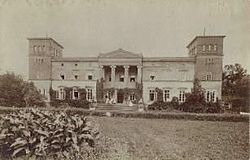
|
Maidburg in Poznan 1904–1919
1904 On the initiative of Ida von Kortzfleisch, the Reifenstein Association buys Maidburg Castle in the Kempen district in Poznan . The school is operated with a seminar and from 1907 with a land maintenance station. 1919: The Versailles peace treaty stipulates that the Kempen district is part of Poland, and the school is not allowed to continue and has to be sold. |

|

|
Scherpingen in West Prussia 1908–1928
1908 The castle-like mansion of the Scherpingen estate is bought and a school (also in the gardening area) is opened. Because of their proximity to the front, the students were sent home or to other schools when the war broke out in 1914. The school was used as a hospital. Classes could start again at the end of 1915. The area became Polish at the end of the war in 1918. The board of trustees succeeded in founding the “Danzig Association for Economic Women's School Scherpingen” in order to save the property from expropriation. The students now came mainly from Poland. From around 1925, all Reich Germans (teachers and students) were expelled. Only those who had Polish or Danzig citizenship were allowed to stay. In 1929 the Polish authorities ordered the school to be closed. |

|

|
Bad Weilbach 1911–1972
In 1911 the Reifensteiner Verband bought the Kurhaus with outbuildings, a large park and sulfur spring in Bad Weilbach and opened the fifth women's school. The Bad Weilbach colonial women's school is affiliated from 1911 to 1914. On its retreat, the German army occupied the house in 1917-18, which was occupied by the French occupation forces in 1918. In October 1919 the school was able to reopen after extensive cleaning work. The association is a partner and on the supervisory board of the associated GmbH. A voluntary labor service camp was opened on the site in 1933 and a country school home for girls in 1935. During the war, the school had soldiers billeted several times and also a military hospital from Wiesbaden. After 1945 Americans occupied the house. In 1946, classes could be resumed until, in the late 1960s, the association was forced to sell the property. Classes continued until 1972, when the school had to be closed. |

|

|
Kronprinzessin-Cecilien-Schule Metgethen in East Prussia 1912–1944
In the "Agricultural Housewives Association" founded by Elisabeth Boehm in Stepphuhn in East Prussia, the desire arose to create a training facility for teachers based on the schools of Ida von Kortzfleisch. The school opened in 1912, made possible by donations. The women's school is initially run by the Association for Economic Women's Schools for East Prussia. 1916 Due to the effects of the war from 1914 to 1918 (billeting, food shortages, financial difficulties), Metgethen was offered as a gift to the Reifensteiner Verband, which took over the school. The Treaty of Versailles separated East Prussia from the German Empire ( Polish corridor ). This made it necessary to expand the range of courses for Metgethen to meet the special needs of this province. The outbreak of war in 1939 caused particular difficulties due to military use, which had to be closed at the end of 1944 due to the proximity to the front. The house was confiscated to accommodate a staff of the Reich Defense Commissioner with 100 men. Some teachers were obliged to look after the soldiers. In February 1945 the Russian army moved further and further into East Prussia. The Metgethen women's school building was destroyed in February 1945. |

|
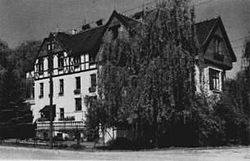
|
Oberzwehren near Kassel 1917–1944
The Reifensteiner School was built in 1904 as an economic women's school of the Auguste Förster Foundation in cooperation with the Cassel Women's Education Association and moved into in 1906. Auguste Förster was one of Ida von Kortzfleisch's supporters in setting up the Reifenstein schools. In April 1917 the Reifensteiner Verband bought the Oberzwehren school . The school had space for 27 home economics students and 5 horticultural students. For economic reasons, the Reifensteiner Verband was no longer able to hold the school during the inflationary period and sold it in 1921 to the Kurhessen Chamber of Agriculture, which continued it as a rural housekeeping school. The school was affiliated to the Reichsnährstand in 1933; it continued to exist as a rural women’s school from 1936 to 1943 and was closed in 1944. |

|

|
Chattenbühl (Kattenbühl) near Hannoversch Münden 1918–1964
1918 Purchase of the former Rehbocksweide health and recreation home. 1964 closure of the women's school. |

|

|
Wöltingerode near Goslar 1918–1990
After the renovation of the former Cistercian convent, classes began in October 1918 with 37 students. In the years 1918 to 1932 there were repeated changes in the field of teaching staff and in the field of education, the number of female students fell drastically. In the spring of 1945, teachers and 12 students had to move to the adjoining building because of the stationing of the German air force, two outsourced authorities and many refugees. From June 22, 1945, the English occupation occupied all buildings. On May 20, 1946, the school was reopened by the British military authorities. From 1951 to the 1980s, renovations were carried out on a regular basis, including new equipment for the rooms and new training opportunities. On August 1, 1990, the school was transferred to the Christliche Jugenddorfwerk Deutschland e. V. handed over. |

|
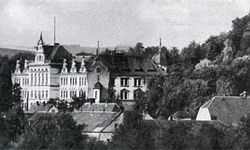
|
Maidhof in Gnadenfrei in Silesia 1919–1945
1919 The former secondary school of the Moravian Brethren is bought for the women's school . 1943/44 The location and size of the school make it a sought-after object for war purposes. The school is relocated to the Petersdorf am Zobten Castle, where it can exist until February 1945. |

|

|
Beinrode near Leinefeld in Thuringia 1920–1949
1920 Establishment of a school for the training of rural house servants in the former Vorwerk of the Reifenstein domain. 1949 Closure of the facility, which has been nationalized since 1946. |

|

|
Wittgenstein in the Sauerland 1928–1990
After extensive renovation work, the school was opened at Easter 1928 on the property near Birkelbach acquired by the Reifensteiner Verband with buildings and usable areas. The number of female students rose steadily. From September 1939 the school was planned as a reserve hospital. From 1944 onwards, almost all female pupils in armaments factories were conscripted. In November 1945, school operations could be resumed. From 1946 to 1952 the school took on the girls' section of the destroyed agricultural school in Erndtebrück. From the mid-1950s to 1980, the number of female students rose to 170. In 1980 the first male student was accepted into the Wittgenstein School. In the mid-1980s, however, the number of female pupils began to drop so sharply that, despite constantly changing training opportunities, the Reifensteiner Association transferred its school to the Christliche Jugenddorfwerk Deutschland e. V. handed over. The Wittgenstein school will be continued as the “Wittgenstein Youth Village - Reifenstein School”. |
|

|
Schertlinhaus in Burtenbach 1939–1945
In March 1939, the Reifensteiner Verband took over the Schertlinhaus girls' education center near Burtenbach . On May 1, 1939, lessons began with a year of rural home economics training. The teaching and business operations were rebuilt in order to be able to offer a second year of training later. The existence of this women's school was repeatedly called into question by disputes with the authorities. From 1942 to 1945 Anna von Kortzfleisch, niece of Ida von Kortzfleisch, was the director of the school in Burtenbach. 44/45 the school gets into a dispute between the rural farmers and the Ministry of Education over the existence of rural women schools. The Schertlinhaus had to close at the end of the war. After the war ended, the headmistress and the teachers stayed at the school until the house was occupied by 650 refugees in 1946. They founded a cooperative for the severely disabled. The association sold the school to the Inner Mission Nuremberg. |
|
Associated Schools
Here, women's schools and related training facilities are listed that were affiliated with the Reifensteiner Association.
| image | description | School needle |
|---|---|---|

|
Economic women's school Agnesschule, Bad Lauterberg im Harz 1912–1918
Owner Miss Hunäus. Affiliated with the Reifensteiner Verband since 1917. In 1918 the school was closed because it no longer met the requirements and moved to Hannoversch Münden. |

|
|
Rural school for women and teaching estate Amalienruh near Meiningen in Thuringia 1904–1920 (Sülzfeld)
Administrator Freiin Elisabeth von Pawel-Rammingen. Officially affiliated to the Reifensteiner Verband from 1916, before that there was a close cooperation. |

|
|

|
Economic women's school, later Arvedshof rural women's school near Leipzig 1906–1949 ( Elbisbach (Frohburg) )
Owner Therese Roßbach until 1924. Sale to the Chamber of Agriculture of the Free State of Saxony. Affiliated with the Reifensteiner Verband since 1906. From 1933 the school was affiliated to the Reichsnährstand. In 1945 it experienced first American and then Russian occupation. |
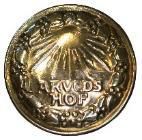
|
| [no photo available] |
Brakwater training farm near Windhoek in South West Africa (now Namibia ), attached in 1909, date of closure unknown
Owner Helene von Falkenhausen. Affiliated with the Reifensteiner Verband since 1906 |
|

|
House and agricultural training company Dorotheenhof near Ilfeld in the Harz 1919–1948 / 49 ( Neustadt / Harz )
Owner Anna Dorothea Haase. Affiliated with the Reifenstein Association in 1923. |

|

|
Household school Elly Hölterhoff-Böcking-Stiftung in Honnef am Rhein , from 1928 economic women's school 1906–1939
Owner of the Elly Hölterhoff Böcking Foundation at the University of Bonn. Affiliated with the Reifenstein Association from 1914 to 1936. Today the Physics Center Bad Honnef . |
|
| [no photo available] |
Rural housekeeping school Elsenschule Marburg an der Lahn 1921–1922
Owners Dorothea Hassenpflug and Sophie Kiekebusch. Affiliated with the Reifensteiner Verband since 1921. The school was one of the many smaller institutions that could not survive the inflationary period. |
|

|
Rural women's school in Falkenberg in the Mark 1920–1922
Head of Dr. Hertha Wienecke. Affiliated with the Reifensteiner Verband since 1921. |
|

|
Economic women's school in Frankenthal in the Palatinate 1910–1920
Owner of the association of Palatinate associations for women's interests. Affiliated with the Reifenstein Association in 1917. |
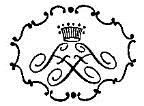
|
| [no photo available] |
German women's school in Gaienhofen am Untersee in Baden 1915 / 16-1924
Owner Gertrud Petersen. Affiliated with the Reifenstein Association since 1917. |
|

|
Gardening and household school Haus Gandersheim in Kaiserswerth am Rhein 1909–1933 / 34, 1925 moved to the fruit farm Schwalbenstein near Balduinstein / Lahn
Owner of the Catholic Women's Association until 1914, then the Society for Agricultural Women's Education GmbH in Nordborchen near Paderborn. Affiliated to the Reifensteiner Verband from 1909 to 1933. |
|
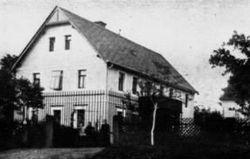
|
Country house keeping school, from 1917 economic women's school in Groß-Graupa near Pirna in Saxony 1911–1924
Owner Anna Thieme. From 1915 the country house keeping school in Groß-Graupa was subordinate to the Royal Saxon Ministry of the Interior. Affiliated with the Reifenstein Association since 1917. |
|

|
Economic women's school, later rural women's school in Groß-Sachsenheim in Württemberg 1908–1954 (Sachsenheim)
Owner of the Württemberg Association for Economic Women's Schools in the Country. V., from 1936 under the name Association for the rural women school in Groß-Sachsenheim. Affiliated with the Reifensteiner Association since 1908. |

|
| [no photo available] | Landfrauenschule Helmstedt , date of foundation not known –1962 | |

|
Economic women's school Inselbad zu Paderborn 1917–1932
Owner of the Society for Agricultural Women's Education GmbH in Nordborchen near Paderborn. Affiliated with the Reifenstein Association since 1917. |
|
| [no photo available] | Agricultural housekeeping school, then economic women's school, later rural women's school Liebfrauenschule of the Sisters of Our Lady of Geldern in the Prussian administrative district of Düsseldorf 1892 - date of closure unknown | |

|
Economic women's school Lindau in Reutin 1928 - date of closure unknown
Head of Käte Buchwald. Affiliated with the Reifensteiner Verband since 1928. |
|

|
Agricultural women's school Lehrgut Lindenhof near Hamburg 1925–1931
Owner Wilhelm Gratenau, wholesale merchant and sawmill owner from Hamburg. Affiliated to the Reifenstein Association since 1925. |

|

|
Economic women's school Löbichau in Thuringia 1908–1930
Owner of the German Aristocratic Association . Affiliated with the Reifensteiner Association since 1908. Freya von Moltke , b. Deichmann attended school for one year from April 1928. |
|

|
Economic women's school, later rural women's school Luisenhof near Bärwalde in the Neumark 1914–1945
Owner of the board of directors of Evangelische Frauenhilfe e. V. with the support of Empress Auguste Viktoria. Affiliated to the Reifensteiner Verband since 1914. |
|

|
Economic women's school Malchow in Mecklenburg 1916–1949
Owner of the Mecklenburgischer Frauenschulverband, Schwerin, from 1920 the Mecklenburg-Schwerin Chamber of Agriculture, from 1934 the Mecklenburg State Farmers' Association in the Reichsnährstand. From 1945 state government of Mecklenburg. Affiliated with the Reifensteiner Verband since 1916. |
|

|
Commercial women's school Mallinckrodthof on Haus Borchen in Nordborchen near Paderborn 1912–2004
Owner of the Society for Agricultural Women's Education GmbH in Nordborchen. Affiliated with the Reifensteiner Verband since 1912. From 1942 Provincial Agricultural School in Nordborchen, from 1970 Mallinckrodthof women's training institute, later: Mallinckrodthof vocational college, occupational field nutrition and housekeeping. |

|
| [no photo available] | Economic women's school of the Maria-Marthastiftes of the evangelical St. Johannisverein in Lindau / Bodensee with the Priel teaching estate attached to the women's school, data of the inventory not known | |

|
Fruit and horticultural school in Marienfelde near Berlin 1899–1921
Owner Dr. Elvira Castner . Affiliated with the Reifenstein Association since 1917. |
|

|
Economic women's school, later rural women's school in Miesbach in Upper Bavaria , previously Geiselgasteig 1903 until today
Owner of the Bavarian association for economic women's schools in the country, from 1932 association for the economic women's school in Miesbach and the agricultural teaching estate of Straß-Moos. Affiliated with the Reifenstein Association since 1903. From 1977 state vocational training center for home economics with a vocational school, vocational high school and specialist academy for home economics. Today: State vocational school center with vocational school for child care, vocational school for nutrition and supply. |
|

|
Rural housewives school in Nassau an der Lahn , formerly Kühn-Maßmann housekeeping school 1905–1922
Owners Miss Kühn and Miss Maßmann. Affiliated with the Reifenstein Association since 1917. |
|

|
Economic women's school, later rural women's school in Neudietendorf in Thuringia 1920–1948
Owner of the Zinzendorf Schools Association of the German Brothers Unity , located in Herrnhut in Saxony. Affiliated with the Reifenstein Association since 1923. |
|
| [no photo available] | Rural women's school Petersschule in Neuendorf near Lyck , Prussian administrative district Allenstein / East Prussia 1925 - date of closure not known | |

|
Economic women's school Rothenburg ob der Tauber with the Zehlersgut near Rothenburg 1916–1931
Owner of the Bavarian Association for Economic Women's Schools in the Country. Affiliated with the Reifensteiner Verband since 1916. |
|
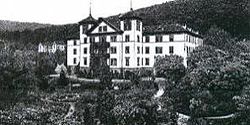
|
House and agricultural education facility at Schloss Brugghalden in Neckargemünd 1921–1924
Owner Mrs. Brugger. Affiliated with the Reifensteiner Verband since 1921. |
|

|
Rural housekeeping school in Stedten Castle near Erfurt, from 1930 rural housekeeping apprenticeship 1921–1933
Owner Lolo Countess von Keller. Affiliated to the Reifenstein Association since 1924. |

|
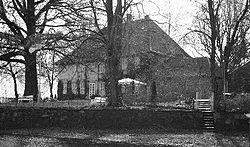
|
Lehrwirtschaft Schnackenburg an der Elbe west of Wittenberge, closed in 1922
Owner Countess Clara Bernstorff. Affiliated with the Reifensteiner Verband since 1921. |
|

|
Agricultural teaching estate Schorn near Pöttmes , relocated to Straß-Moos near Neuburg an der Donau , from 1935 rural women's school in Straß , 1917–1956
Owner until 1939 of the Bavarian Association for Economic Women's Schools in the Country, later unnamed in the Bavarian Association of Rural Schools, from 1939 owned by the State of Bavaria. Affiliated to the Reifensteiner Verband from 1917. From 1956 it was continued as a rural women's school in Triesdorf in Middle Franconia |
|

|
Schwalbenstein fruit farm near Balduinstein / Lahn, closed 1925–1933
Owner of the Society for Agricultural Women's Education GmbH in Nordborchen near Paderborn. Before the relocation, the Gandersheim gardening and household school in Kaiserwerth am Rhein. |
|

|
Economic women's school, later Selikum rural women's school at Reuschenberg Castle near Neuss on the Rhine in 1917 - existed until the 1980s
The owner is the Gesellschaft für Landwirtschaftliche Frauenbildung GmbH in Nordborchen near Paderborn. Affiliated to the Reifenstein Association from 1917. From 1969 institute for women’s education in agriculture and housekeeping, from 1980 vocational school for rural housekeeping, college for nutrition and housekeeping. |
|
| [no photo available] |
Agricultural housekeeping school Sonnenblick near Sondershausen in Thuringia, closed in 1924
Owner Mrs. Major Mellinghoff. Affiliated with the Reifensteiner Verband since 1920 |
|
| [no photo available] |
Agricultural training company Sonnenhof in Neuendorf in the Königsberg district in East Prussia 1920–1924
Owners Irene Freiin von Gayl and Margarete von Spies. Affiliated with the Reifensteiner Verband since 1920. |
|
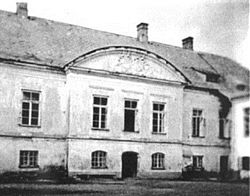
|
Economic school for women, Stift Finn in Estonia 1922–1939
Owner of the noble women's monastery Johann Diedrichstein in Finn. Affiliated with the Reifensteiner Verband from 1926 to around 1936. |
|

|
Agricultural teaching estate Straß-Moos near Neuburg an der Donau, from 1935 rural women's school in Straß, from 1956 continued as rural women's school in Triesdorf in Middle Franconia |

|

|
Rural women seminar for rural training and youth care in Sülzfeld near Meiningen 1916–1920
Owner Baron von Pawel-Rammingen. |
|

|
Home economics school for women Theresenhaus in Rochlitz , later in Grimma in Saxony 1910–1933
Owners Mathilde and Elisabeth Wörner. Affiliated to the Reifensteiner Verband since 1910. |

|
| [no photo available] | Agricultural District Household School Triesdorf, from 1935 Landfrauenschule Triesdorf in Middle Franconia 1913–1956 | |

|
Economic women's school, later the Trillke-Gut rural school in Hildesheim , from 1940 to 1958 in Haus Harderode near Hameln, then returned to Trillke-Gut 1928–1993
From 1928 to 1976 owner of the Hanover Chamber of Agriculture, from 1976 the district of Hildesheim. Affiliated with the Reifenstein Association since around 1932. |

|

|
House and agricultural training company Waldhaus Häcklingen near Lüneburg - Häcklingen 1917–1923
Owner Margarete Endemann. Affiliated with the Reifenstein Association in 1917. |
|
| [no photo available] |
Economic women's school in Wolfratshausen in the Isar valley south of Munich, later agricultural women's school 1926–1938
Responsible for the women's school: Local group Munich of the Jewish Women's Association . |
literature
- General publication of the Reifensteiner Verein, Gotha 1915
- Johannes Kramer: The rural domestic education system in Germany, dissertation at the University of Erlangen, Fulda 1913
- Ortrud Wörner-Heil: Noble women as pioneers of vocational training: rural housekeeping and the Reifensteiner Verband kassel university press GmbH, 2010
- Ortrud Wörner-Heil: Women's schools in the country - Reifensteiner Verband (1897–1997), series of publications by the Archives of the German Women's Movement, Volume 11, Archives of the Women's Movement, 1997
- Juliane Jacobi: Girls and Women Education in Europe - from 1500 to the present, Campus Verlag, 2013
Web links
- Association website www.reifensteiner-verband.de/
- Museum Obernkirchen
- Reifenstein monastery church
- Women's places-Lower Saxony
